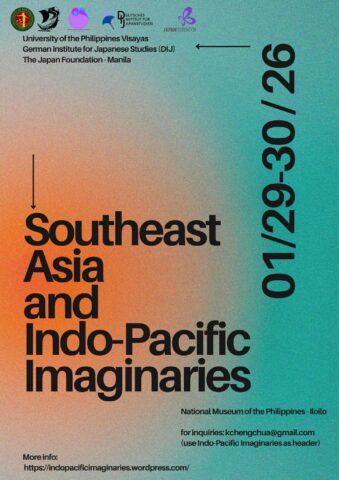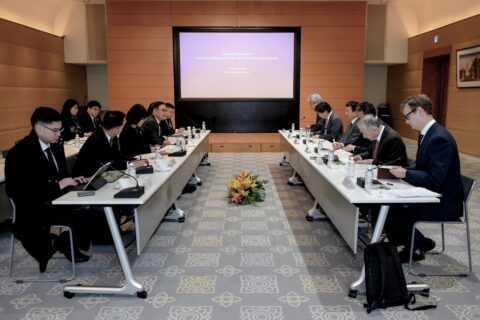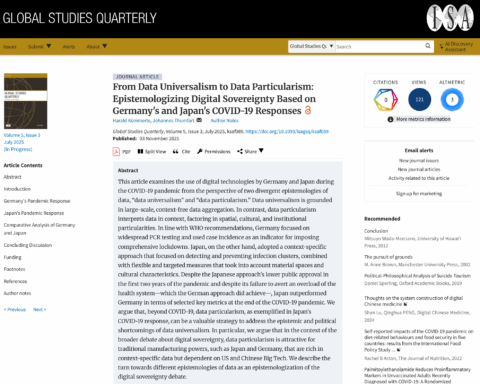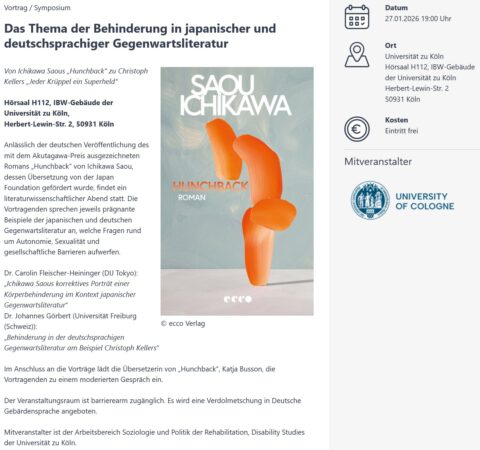イベント&アクティビティ
DIJ researchers at ‘Southeast Asia and Indo-Pacific Imaginaries’ conference
 The present geopolitical landscapes are shifting, with global powers realigning their strategies. The Free and Open Indo-Pacific (FOIP), a concept proposed by then Prime Minister Shinzo Abe, aims at promoting peace and prosperity in the region, particularly in the fields of fundamental values, economic prosperity, and peace and stability. Southeast Asia has been one center of this strategy with a particular focus on maritime security and safety. The conference Southeast Asia and Indo-Pacific Imaginaries takes an interdisciplinary approach to study FOIP strategies. It features two DIJ panels, including research papers by David M. Malitz (“Japanese-Indian Relations and the Imaginations of an Indo-Pacific Region”) and Dolf-Alexander Neuhaus (“Developmental Imaginaries: Japan’s Educational Aid Programs and the Shaping of the Indo-Pacific Order”). The conference is co-hosted by University of the Philippines – Visayas, the Japan Foundation Manila, and the DIJ and takes place 29–30 January 2026 at the National Museum of the Philippines, Iloilo.
The present geopolitical landscapes are shifting, with global powers realigning their strategies. The Free and Open Indo-Pacific (FOIP), a concept proposed by then Prime Minister Shinzo Abe, aims at promoting peace and prosperity in the region, particularly in the fields of fundamental values, economic prosperity, and peace and stability. Southeast Asia has been one center of this strategy with a particular focus on maritime security and safety. The conference Southeast Asia and Indo-Pacific Imaginaries takes an interdisciplinary approach to study FOIP strategies. It features two DIJ panels, including research papers by David M. Malitz (“Japanese-Indian Relations and the Imaginations of an Indo-Pacific Region”) and Dolf-Alexander Neuhaus (“Developmental Imaginaries: Japan’s Educational Aid Programs and the Shaping of the Indo-Pacific Order”). The conference is co-hosted by University of the Philippines – Visayas, the Japan Foundation Manila, and the DIJ and takes place 29–30 January 2026 at the National Museum of the Philippines, Iloilo.
David Malitz joins roundtable discussion with Thai Foreign Minister
 On December 19th, DIJ Principal Researcher David M. Malitz was invited to join a roundtable discussion with Thai Foreign Minister Sihasak Phuangketkeow and Japanese academics at the Royal Thai Embassy in Tokyo. As the head of the research cluster Japan in Transregional Perspective, David conducts research on Japan-Southeast Asia relations. The discussion covered regional developments, Japan-Thailand relations, and potential future cooperation between the two countries. Thailand is a key economic partner of Japan, hosting approximately 6,000 Japanese companies and over 70,000 Japanese nationals. In November 2022, bilateral relations were elevated to the status of a Comprehensive Strategic Partnership. The year 2027 will mark the 140th anniversary of the establishment of diplomatic relations between Japan and Thailand.
On December 19th, DIJ Principal Researcher David M. Malitz was invited to join a roundtable discussion with Thai Foreign Minister Sihasak Phuangketkeow and Japanese academics at the Royal Thai Embassy in Tokyo. As the head of the research cluster Japan in Transregional Perspective, David conducts research on Japan-Southeast Asia relations. The discussion covered regional developments, Japan-Thailand relations, and potential future cooperation between the two countries. Thailand is a key economic partner of Japan, hosting approximately 6,000 Japanese companies and over 70,000 Japanese nationals. In November 2022, bilateral relations were elevated to the status of a Comprehensive Strategic Partnership. The year 2027 will mark the 140th anniversary of the establishment of diplomatic relations between Japan and Thailand.
DIJ Newsletter Winter 2025/26
 Innovation, games, machizukuri, climate, and ‘the mouse’: the winter issue of our DIJ Newsletter features updates on our research, publications, and events as well as news from the Institute, our team, and our outreach activities. We hope you will enjoy exploring this new edition of the DIJ Newsletter. If you haven’t done so yet, you can subscribe to receive our Newsletters directly to your inbox. The full issues and subscription form are available here.
Innovation, games, machizukuri, climate, and ‘the mouse’: the winter issue of our DIJ Newsletter features updates on our research, publications, and events as well as news from the Institute, our team, and our outreach activities. We hope you will enjoy exploring this new edition of the DIJ Newsletter. If you haven’t done so yet, you can subscribe to receive our Newsletters directly to your inbox. The full issues and subscription form are available here.
New book chapter and article by Harald Kümmerle on Mathematical Knowledge and Digital Sovereignty

Two new studies by DIJ researcher Harald Kümmerle were recently published. His book chapter “Bridging Göttingen and Tokyo: Oral Culture and the Dynamics of Mathematical Knowledge”, published in Felix Klein’s Foreign Students. Opening Up the Way for Transnational Mathematics (Birkhäuser Cham 2025), examines the reception of Felix Klein’s school of mathematical productivity in Japan, particularly at Tokyo Imperial University, whose central position within Japan contrasts with Göttingen University’s peripheral position within Germany. The study focuses on the work of two Japanese mathematicians, Tsuruichi Hayashi and Takuji Yoshiye. Harald’s article “Datenströme und Raumordnung. Japans Regulierungsmodell im globalen Kontext” (Data flows and spatial order. Japan’s regulatory model in a global context), published in German in the Zeitschrift für Digitalisierung und Recht (4/2025), studies how data flows are embedded in geographical and economic orders and constitute spaces themselves. Focusing on developments in Japan, the article shows that data flows are not only technical or regulatory objects, but space-constituting phenomena in which Japan’s consensus-oriented regulatory model appears as a relevant factor in global order-making.
DIJ Expertise on Japanese Economy and Society in German Media

For German media Deutsche Welle (DW) and Deutschlandfunk (DLF), Franz Waldenberger and Sebastian Polak-Rottmann have contributed their expertise in the fields of Japan’s economy and society, respectively. In a DW online article on Japan’s monetary policy, Franz Waldenberger explained that while the Japanese government was highly indebted, the economy as a whole was “rich”. Japan’s share of net foreign assets as percentage of GDP was “among the highest in the world”, he said. “I call it ‘rich country, poor government'”. In a German-language DLF radio feature on the problem of Japan’s abandoned houses (akiya mondai), Sebastian Polak-Rottmann commented on abandoned houses are “a symptom of demographic change and of migration” that could be observed both in rural and in urban areas. Since empty houses in rural areas often had strong family ties for their owners, many did not want to sell them, he explained.
Open access article co-authored by Harald Kümmerle studies use of digital technologies by Germany and Japan
 How have Germany and Japan used digital technologies during the COVID-19 pandemic? From the perspective of two divergent epistemologies of data, the open access article “From Data Universalism to Data Particularism: Epistemologizing Digital Sovereignty Based on Germany’s and Japan’s COVID-19 Responses” (Global Studies Quarterly, Vol. 5, Issue 3) by DIJ’s Harald Kümmerle and (Brussels) compares both countries’ use of data and their responses to the pandemic. Observing that Japan outperformed Germany in terms of selected key metrics at the end of the COVID-19 pandemic, the article argues that data particularism, as exemplified in Japan’s COVID-19 response, can be a valuable strategy to address the epistemic and political shortcomings of data universalism. In particular, the authors argue that in the context of the broader debate about digital sovereignty, data particularism is attractive for traditional manufacturing powers, such as Japan and Germany, that are rich in context-specific data but dependent on US and Chinese Big Tech.
How have Germany and Japan used digital technologies during the COVID-19 pandemic? From the perspective of two divergent epistemologies of data, the open access article “From Data Universalism to Data Particularism: Epistemologizing Digital Sovereignty Based on Germany’s and Japan’s COVID-19 Responses” (Global Studies Quarterly, Vol. 5, Issue 3) by DIJ’s Harald Kümmerle and (Brussels) compares both countries’ use of data and their responses to the pandemic. Observing that Japan outperformed Germany in terms of selected key metrics at the end of the COVID-19 pandemic, the article argues that data particularism, as exemplified in Japan’s COVID-19 response, can be a valuable strategy to address the epistemic and political shortcomings of data universalism. In particular, the authors argue that in the context of the broader debate about digital sovereignty, data particularism is attractive for traditional manufacturing powers, such as Japan and Germany, that are rich in context-specific data but dependent on US and Chinese Big Tech.
Vortrag von Carolin Fleischer-Heininger zu Behinderung in japanischer Gegenwartsliteratur

Im Jahr 2023 gewann der Roman „Hunchback“ von Ichikawa Saou den renommierten Akutagawa-Preis, jetzt liegt er in deutscher Übersetzung vor. Aus diesem Anlass veranstaltet das Japanische Kulturinstitut Köln zusammen mit dem Arbeitsbereich Soziologie und Politik der Rehabilitation, Disability Studies der Universität Köln den literaturwissenschaftlichen Abend “Das Thema der Behinderung in japanischer und deutschsprachiger Gegenwartsliteratur: Von Ichikawa Saous „Hunchback“ zu Christoph Kellers „Jeder Krüppel ein Superheld“. Die zwei Vortragenden sprechen prägnante Beispiele der japanischen und deutschen Gegenwartsliteratur an, die Fragen rund um Autonomie, Sexualität und gesellschaftliche Barrieren aufwerfen. Zu Japan spricht DIJ-Literaturwissenschaftlerin Carolin Fleischer-Heininger („Ichikawa Saous korrektives Porträt einer Körperbehinderung im Kontext japanischer Gegenwartsliteratur“). Im Anschluss an die Vorträge lädt die Übersetzerin von „Hunchback“, Katja Busson, die Vortragenden zu einem moderierten Gespräch ein. Der Veranstaltung findet am 27. Januar an der Universität Köln statt. Es wird eine Verdolmetschung in Deutsche Gebärdensprache angeboten.
Hybrid Workshop on Machizukuri and Adaptive Governance in Hita

This hybrid bilingual workshop focuses on local initiatives in response to the current challenges facing regional Japan, exemplified by the city of Hita in Ōita Prefecture. The event combines the perspectives of two scholars on this area in Northern Kyushu and one practitioner from the field. It addresses aspects of local resilience in times of disruption and postgrowth. The speakers illustrate two different revitalization approaches, displaying the merits and limitations of tourist-based machizukuri, or “town-making” activities. The aim of the workshop is to critically engage in a discussion about adaptation processes in rural Japan. Investigating the same region from three different angles promises a more nuanced understanding of social dynamics and societal change. After the three presentations, a panel discussion including Q&A will conclude the event. Details and registration here





 Open Access
Open Access
